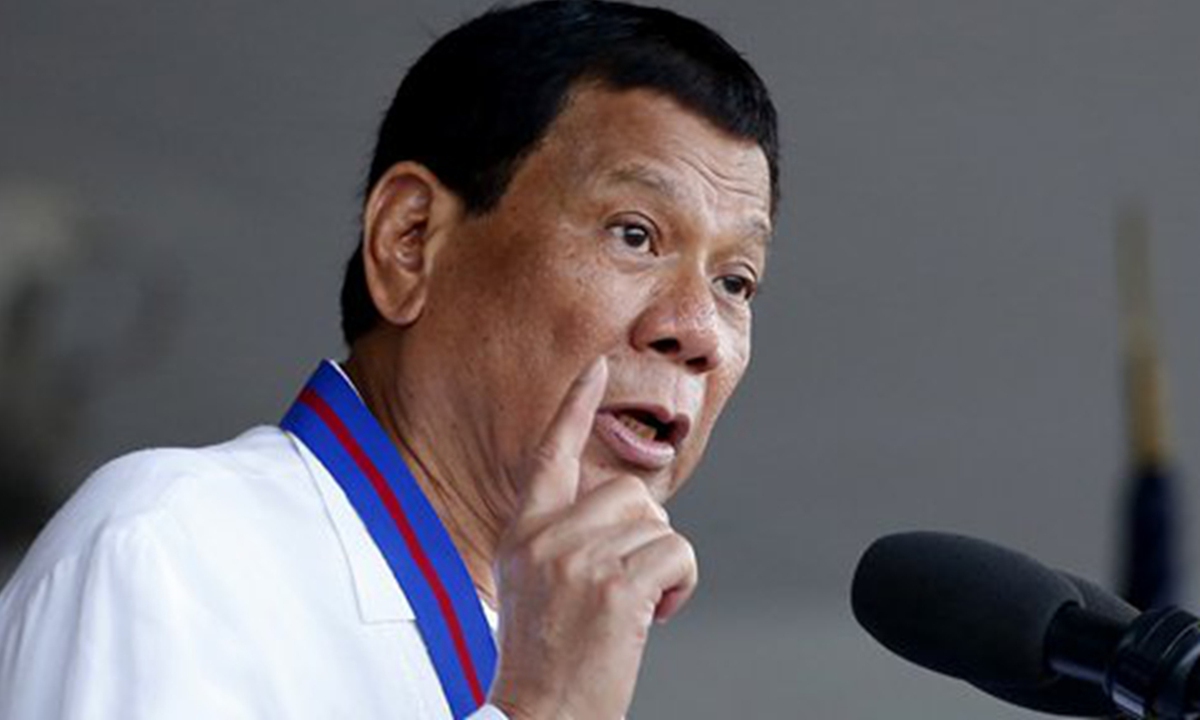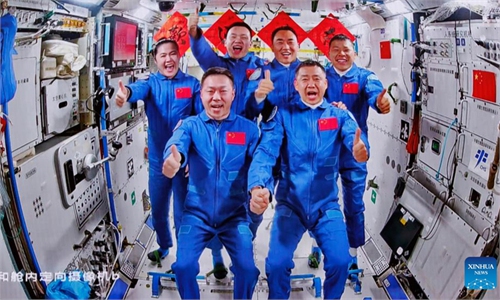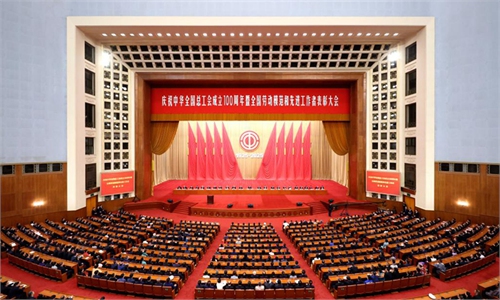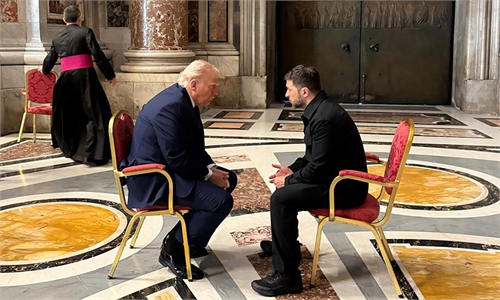Philippine ex-president Duterte wins mayoral race in mid-term elections: preliminary results; midterms show the Duterte family's legacy remain strong: experts

Photo: IC
Former Philippine President Rodrigo Duterte has again won the mayorship of Davao city in this year's mid-term elections, according to preliminary results on Monday evening, the Xinhua News Agency reported on late Monday.
With more than 60 percent of the votes counted, Duterte had established a commanding lead, securing 405,000 votes compared to 49,000 for his closest rival, according to figures from the Commission on Elections reported by local media.
The result reflected the tenacious support for Duterte himself and his family, despite the former president being detained in The Hague, Gu Xiaosong, dean of the ASEAN Research Institute of Hainan Tropical Ocean University, told the Global Times on Tuesday.
The former president was arrested last March at Manila's international airport and was then taken to the International Criminal Court (ICC) in The Hague, the Netherlands, where he is still being detained, Xinhua reported
According to a Xinhua report on March 13, Duterte was detained following an arrest warrant issued by the ICC over his "war on drugs" campaign, a move he has questioned.
A hearing for the confirmation of charges is scheduled for September 23, according to the ICC website.
According to Xinhua, under Philippine election law, only a criminal conviction in a local court can keep a candidate off the ballot.
According to the New York Times, Duterte was the city's mayor for 22 years, in three separate stretches, before assuming the presidency.
On Duterte's 80th birthday in March, tens of thousands gathered in the city, lighting candles and singing. Campaigns by his supporters have been dominated by calls for him to be returned to the Philippines, the Guardian said on Monday.
It is unclear how Duterte would take his oath to assume office as mayor. His daughter, impeached vice-president Sara Duterte, said this was being discussed by "his ICC lawyers and his Filipino lawyers," according to the Guardian report.
It is expected that, given the former president is imprisoned in the Netherlands, duties could instead be assumed by the vice-mayor - a race his son, Sebastian, was also on track to win, the Guardian said.
Another Duterte son, Paolo, was re-elected as congressman, per the BBC.
The BBC reported that the midterms - which saw 18,000 seats contested from local officials to governors and senators - became a proxy war between supports of Sara Duterte and her former ally, current President Ferdinand Marcos Jr.
Sara Duterte was impeached by the House of Representatives in February and would face trial in 24-seat Senate, where half of the members were being elected on Monday. If Sara were to be found guilty by the senate, she would be barred from office - preventing her from running for president in 2028, according to the Guardian.
A two-thirds vote, of at least 16 senate members, is required to convict an impeached official, according to the Guardian.
Candidates supporting either side went head-to-head, with Duterte's camp seeking the nine senate votes she needs to avoid impeachment. But an unofficial tally of 68 percent of the vote suggests it is unclear which way it has gone, according to the BBC.
The 2025 midterm election marked a resurge for the Dutertes, the Times Magazine reported Tuesday, citing preliminary results.
In the Senate, key Duterte allies won re-election by wide margins, including Christopher Go, Rodrigo's former aide, who received the most votes, and Ronald dela Rosa, the former national police chief, who ranked third in the overall vote tally. Another Duterte-allied lawmaker from the lower legislative chamber, Rep. Rodante Marcoleta, also secured a Senate seat. Marcoleta previously stated that he would defend Sara against impeachment, per the Times Magazine.
As of midnight Monday, five Duterte-aligned candidates were on course to secure seats in the senate, while allies of Marcos were projected to win six seats, fewer than had been predicted, according to the Guardian.
The midterms, especially the contest in the Senate would decide the political fate for Sara and serve as a bellwether for her popularity ahead of a potential 2028 presidential bid, Gu said. "So far, the fierce contest between Dutertes' supporters and their rivals suggests that Marcos Jr's one-sided pro-US policy does not fully align with the Philippines' development interests, and some Philippine people strongly oppose it," he noted.
Ding Duo, director of the Research Center for International and Regional Studies at the National Institute for South China Sea Studies, told the Global Times on Tuesday that the results show that it is difficult for Marcos Jr to completely suppress the Duterte family and render them politically irrelevant, as their political legacy remains strong.
According to the BBC, Marcos Jr's endorsements appear to not have worked as predicted by opinion polls - only one of his candidates, broadcaster Erwin Tulfo, made the top five in the unofficial count. The rest of the top five was made up of the two Duterte aides and two independents while there is a tight race for the rest of the winning circle of 12. Instead, the seats instead appear to have gone to independents, according to the BBC.
The fact candidates were currently aligned with Duterte was no guarantee of how they would vote at Sara's trial, said Jean Franco, assistant chair of the University of the Philippines' political science department, according to AFP. "It would be foolhardy to count on their permanent support," she warned.
Anthony Lawrence Borja, associate professor at De La Salle University's political science and development studies department said more senators, "especially those" with plans for presidential elections due in 2028, will find themselves "caught between Marcos Jr.'s waning popularity and control over patronage, and the resurgent popularity of the Dutertes," he said, according to AFP.
In the Senate elections, the opposition and independent candidates outperformed expectations of the Marcos administration, indicating that despite the administration's significant investment of political capital, it did not achieve the anticipated landslide victory. This also reflects dissatisfaction among segments of the Philippine elite and political dynasties with Marcos' policies and actions, Ding said.




